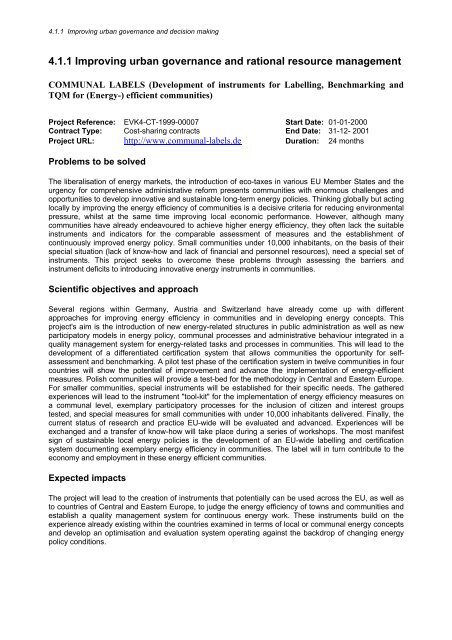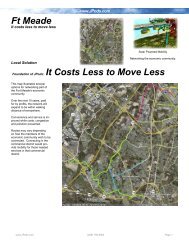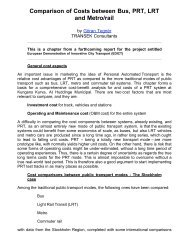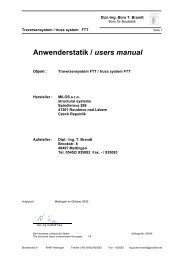FP5 PROJECTS - JPods
FP5 PROJECTS - JPods
FP5 PROJECTS - JPods
You also want an ePaper? Increase the reach of your titles
YUMPU automatically turns print PDFs into web optimized ePapers that Google loves.
4.1.1 Improving urban governance and decision making<br />
4.1.1 Improving urban governance and rational resource management<br />
COMMUNAL LABELS (Development of instruments for Labelling, Benchmarking and<br />
TQM for (Energy-) efficient communities)<br />
Project Reference: EVK4-CT-1999-00007 Start Date: 01-01-2000<br />
Contract Type: Cost-sharing contracts End Date: 31-12- 2001<br />
Project URL: http://www.communal-labels.de Duration: 24 months<br />
Problems to be solved<br />
The liberalisation of energy markets, the introduction of eco-taxes in various EU Member States and the<br />
urgency for comprehensive administrative reform presents communities with enormous challenges and<br />
opportunities to develop innovative and sustainable long-term energy policies. Thinking globally but acting<br />
locally by improving the energy efficiency of communities is a decisive criteria for reducing environmental<br />
pressure, whilst at the same time improving local economic performance. However, although many<br />
communities have already endeavoured to achieve higher energy efficiency, they often lack the suitable<br />
instruments and indicators for the comparable assessment of measures and the establishment of<br />
continuously improved energy policy. Small communities under 10,000 inhabitants, on the basis of their<br />
special situation (lack of know-how and lack of financial and personnel resources), need a special set of<br />
instruments. This project seeks to overcome these problems through assessing the barriers and<br />
instrument deficits to introducing innovative energy instruments in communities.<br />
Scientific objectives and approach<br />
Several regions within Germany, Austria and Switzerland have already come up with different<br />
approaches for improving energy efficiency in communities and in developing energy concepts. This<br />
project's aim is the introduction of new energy-related structures in public administration as well as new<br />
participatory models in energy policy, communal processes and administrative behaviour integrated in a<br />
quality management system for energy-related tasks and processes in communities. This will lead to the<br />
development of a differentiated certification system that allows communities the opportunity for selfassessment<br />
and benchmarking. A pilot test phase of the certification system in twelve communities in four<br />
countries will show the potential of improvement and advance the implementation of energy-efficient<br />
measures. Polish communities will provide a test-bed for the methodology in Central and Eastern Europe.<br />
For smaller communities, special instruments will be established for their specific needs. The gathered<br />
experiences will lead to the instrument "tool-kit" for the implementation of energy efficiency measures on<br />
a communal level, exemplary participatory processes for the inclusion of citizen and interest groups<br />
tested, and special measures for small communities with under 10,000 inhabitants delivered. Finally, the<br />
current status of research and practice EU-wide will be evaluated and advanced. Experiences will be<br />
exchanged and a transfer of know-how will take place during a series of workshops. The most manifest<br />
sign of sustainable local energy policies is the development of an EU-wide labelling and certification<br />
system documenting exemplary energy efficiency in communities. The label will in turn contribute to the<br />
economy and employment in these energy efficient communities.<br />
Expected impacts<br />
The project will lead to the creation of instruments that potentially can be used across the EU, as well as<br />
to countries of Central and Eastern Europe, to judge the energy efficiency of towns and communities and<br />
establish a quality management system for continuous energy work. These instruments build on the<br />
experience already existing within the countries examined in terms of local or communal energy concepts<br />
and develop an optimisation and evaluation system operating against the backdrop of changing energy<br />
policy conditions.








